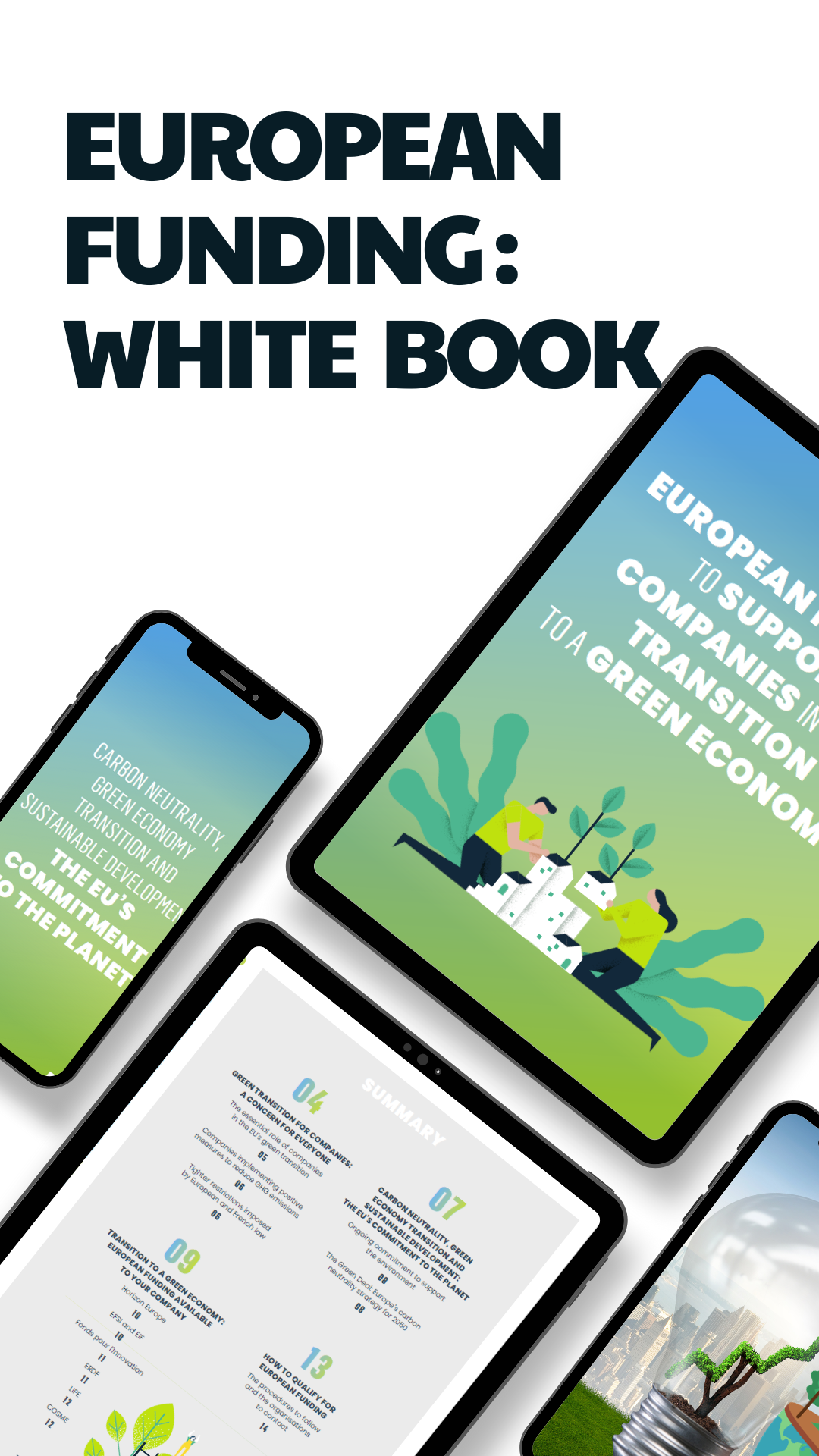Green finance is an umbrella term for all financial operations whose goal is to promote the ecological and energy transition and the fight against climate change. It forms part of a larger body of sustainable finance, alongside solidarity funding directed towards the fight against exclusion and fostering social cohesion, and responsible funding intended to promote socially responsible investments. Green bonds and funds, accreditations, bodies controlling and monitoring commitments, regulations etc.; green finance is evolving rapidly and going far beyond climate finance alone.
The main tools of green finance
Green finance includes green bonds and green funds, among others. The former refers to loans issued on the market by a company or public body (local authority, international organisation) with a view to financing projects contributing to the ecological and energy transition. Companies and individuals can invest in these bonds, which are subject to detailed reporting. Meanwhile, green funds invest in companies for which a large part of their activity offers environmental benefit, whether in water, waste, energy, or something else.
A variety of actors
Banks, insurers, investor capital and management companies make up the principal players in green finance. There are 387 listed by the Sustainable finance observatory(1), set up in 2018 for the purpose of information and transparency. It studies the monitoring of their commitments in the 3 ESG sectors (environment; social & societal; governance). In environmental terms, 9 themes are assessed among which are exiting fossil fuels, GHG reduction & alignment to the Paris Agreement, the evaluation of climate risks and, recently, biodiversity. The Observatory is jointly directed by professional federations and associations – Fédération bancaire française (French Banking Federation – FBF), France Assureurs (French Insurance Federation), France Invest (capital investment), the Association de la gestion financière (French Asset Management Association), the Association française des sociétés financières (French Association of Financial Companies) – and Finance for Tomorrow(2).
Many financial institutions are involved in the Glasgow Financial Alliance for Net Zero (GFANZ), an international coalition launched in 2021 to accelerate decarbonisation of the global economy and attain the “Net zero emissions” objective set by the UN. GFANZ has several variants: NZAM (Asset Management), NZAO (Asset Owners), the Net Zero Banking Alliance, with each of the signatories committed to aligning their investments and portfolios to this objective.
A fast-evolving body of regulation
The European Commission presented an update of its sustainable finance strategy in July 2021. In fact, since 2018 numerous advances have emerged with, in particular, the “Green taxonomy” rules and the SFDR (Sustainable finance disclosure regulation), and the CSRD Directive project on reporting (which replaces the NFRD from 2004). Other changes have already been initiated by the AIFM (Alternative investment fund managers) Directive in 2011 and the Benchmark regulation in 2016. In addition, the growing issue of the risks climate change poses to financial stability also need to be better taken into account. Other texts are still awaited.
Specific accreditations
A number of European accreditations exist for sustainable finance (e.g.: FNG-Siegel, Greenfin, ISR, LuxFLAG, Nordic Swan, Towards Sustainability, Umweltreichen). Launched in 2015 to “guarantee the green quality of investment funds”, the TEEC accreditation – now Greenfin – is for funds in 8 categories of activity: energy, building, waste management and pollution control, industry, clean transport, ICT, agriculture & forestry and climate change adaptation. However, it excludes funds investing in companies active in nuclear and fossil energies. At the end of October 2022, the Greenfin accreditation had been awarded to 95 funds for a total of €33 billion.
Where are we today?
According to the FBF, for every euro invested in fossil fuels (unconventional hydrocarbons, thermal coal, oil and gas), 4 euros are invested in green and sustainable activities and renewables. In 2021, green loans and credits exceeded €100bn in total, of which almost €30bn of new loans were for green and sustainable activities. Financing of renewables reached €42bn, of which €14bn were new flows. And the arrangement of green and sustainable bonds (i.e. Green bonds plus social bonds, sustainable bonds and sustainability-linked bonds) reached €225bn. Fossil energies and exposure to carbon portfolios shrank (€2bn vs €2.1bn in 2020) and hydrocarbon loans were estimated at €23bn. As of today, 7 banking groups(3) are working on decarbonisation trajectories by sector. Likewise, a common methodology for measuring the carbon footprint and alignment of portfolios is being defined.
According to France Assureurs, French companies realised €141bn of green positions by the end of 2021, that’s 6.3% of managed assets (+22.5% in one year). They have invested €92bn in sustainable, green and/or solidarity bonds, of which €54bn are in Green bonds. They are continuing to disinvest in coal (- 15 % at €14.1bn, that’s 0.6 % of managed assets) and their portfolio exposure to oil and gas fell by 4% to €27bn, that’s 1.2% of managed assets. In parallel, companies are strengthening their expertise in the assessment and management of climate risk to investment portfolios (cf. 77 % of managed assets are covered by a climate analysis, that’s €1,739bn)(4).
According to the AFG, management companies invested €71.28bn in green funds in 2021. Their outstanding stocks of sustainable, green and/or solidarity bonds have risen to €124.14bn, of which €96bn are green bonds. Their outstanding stocks in funds accredited as sustainable, green and/or solidarity are €656.7bn. In parallel, their responsible investments reached €2,108bn (+ 33% in one year). Exposure to coal reached €36.41bn, that’s 0.94% of outstanding. The AFG also pointed out the increase in impact investing in 2021: almost one in two management companies (46%) were managing at least one investment, i.e. some €60bn outstanding, of which €28bn were dedicated to fighting climate change.
Disengaging from fossil energies: could do better?
The French financial markets regulator (Autorité des marchés – AMF) and French Prudential Supervision and Resolution Authority (Autorité de contrôle prudentiel et de résolution – ACPR) monitor and assess climate commitments undertaken by actors at the Paris financial centre. In their latest report (October 2022), they estimate that coal financing is decreasing at varying rates – depending on the actors – while the ambition shown by sector policies on other fossil fuels is showing no notable shift. They called for more clarity and precision in the monitoring indicators, particularly for fossil energies. Note however that beyond the reduction in exposure to coal, oil and gas, 92% of insurers have an exclusion policy relating to fossil energies and that since January 2022, 6 banks no longer fund oil or gas projects, nor companies for which exploration and production of unconventional hydrocarbons (shale oil, shale gas, bituminous sands) forms more than 30% of their activities.
According to the ASF, specialised financing establishments contributed notably to the financing of hybrid or electric vehicles (€3.34bn for individuals and €1.5bn for companies) and to the financing of energy renovation for housing (€1.41bn) and to that of green buildings (€2.5bn).
In fact, 2021 set a record for capital investment in clean tech, with €2.3bn invested. These fundraising activities, distributed across 125 operations, involved sectors as diverse as mobility, storage, energy efficiency and the circular economy. And 2022 looks set to continue on this upward trend, with France Invest having listed 55 deals financed to the tune of almost €2bn for the first half of the year. In addition, infrastructure funds have invested €2.2bn in renewable energy in 2021.
1) The Observatory monitors and evaluates the transformation of practices and financial flows. It constantly tracks and monitors the commitments of different actors involved in sustainable finance: https://observatoiredelafinancedurable.com
2) Finance for Tomorrow, the branch of the Paris Europlace launched in June 2017 to “make green and sustainable finance a driving force in the development of the Paris financial centre and to position it as a hub of reference on these issues”, was replaced on 1st January 2023 by the Institut de la Finance durable (the Sustainable Finance Institute), with Yves Perrier as President.
3)BNP Paribas, BPCE, Crédit Agricole, Crédit Mutuel, HSBC Continental Europe, La Banque Postale, Société Générale. We also note that 3 of these banks (SG-CIB,bnP Paribas and CA-CIB) are listed with Natixis SA in the top 10 on the European and global market for loans related to sustainable development, green loans and financing to renewable energy.
4) Data from a panel of 24 insurance groups representing 94% of the total assets managed by companies in France.




